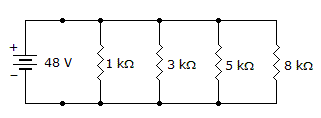Electronics - Parallel Circuits - Discussion
Discussion Forum : Parallel Circuits - True or False (Q.No. 12)
12.
The total power dissipated is 4.8 watts.


Discussion:
22 comments Page 1 of 3.
SAQI said:
9 years ago
Current through 1000 Ohms = 48/1000 = 0.048.
Current through 3000 Ohms = 48/3000 = 0.016.
Current through 5000 Ohms = 48/5000 = 0.0096.
Current through 8000 Ohms = 48/8000 = 0.006.
If All current is add so this total current is 0.0796.
Current through 3000 Ohms = 48/3000 = 0.016.
Current through 5000 Ohms = 48/5000 = 0.0096.
Current through 8000 Ohms = 48/8000 = 0.006.
If All current is add so this total current is 0.0796.
Nerk said:
9 years ago
1000 Ohms
3000 Ohms
5000 Ohms
+ 8000 Ohms
-------------------
48/17,000 = 0.00282353mA * 48V = 0.13552944 watts.
3000 Ohms
5000 Ohms
+ 8000 Ohms
-------------------
48/17,000 = 0.00282353mA * 48V = 0.13552944 watts.
Ruby said:
1 decade ago
Current through 1000 Ohms = 48/1000 = 0.048.
Current through 3000 Ohms = 48/3000 = 0.016.
Current through 5000 Ohms = 48/5000 = 0.0096.
Current through 8000 Ohms = 48/8000 = 0.0796.
Total Current is 0.0796 mA Therefore power dissipated is 0.0796 mA*48V = 3.8208.
Current through 3000 Ohms = 48/3000 = 0.016.
Current through 5000 Ohms = 48/5000 = 0.0096.
Current through 8000 Ohms = 48/8000 = 0.0796.
Total Current is 0.0796 mA Therefore power dissipated is 0.0796 mA*48V = 3.8208.
(1)
Yogesh said:
1 decade ago
How 603 is calculated please explain?
Ashok said:
1 decade ago
Please said 1/R = 199/120. How should we calculate it?
Itishree said:
1 decade ago
1/R = 199/120.
R = 120/199 = 0.6030150754 Kohm.
= 603.01 ohm.
It is approximately equal to 603 ohm.
P = VI = V*V/R.
= 48*48/603.
= 3.820895.
R = 120/199 = 0.6030150754 Kohm.
= 603.01 ohm.
It is approximately equal to 603 ohm.
P = VI = V*V/R.
= 48*48/603.
= 3.820895.
Utkarsh said:
1 decade ago
How could resistance be 603?
Deepanshi yadav said:
1 decade ago
Firstly calculate the equation resistance then current through circuit by ohms law, then finally we can calculate power by p=vi or by p=i^2/r.
Knight said:
1 decade ago
Total Resistance = 1 / [(1/R1) + (1/R2) + (1/R3 + ....) ].
Ameen said:
1 decade ago
If the two leads of resistor is connected to the leads of another one. Then we can say that resistors are in parallel.
Post your comments here:
Quick links
Quantitative Aptitude
Verbal (English)
Reasoning
Programming
Interview
Placement Papers